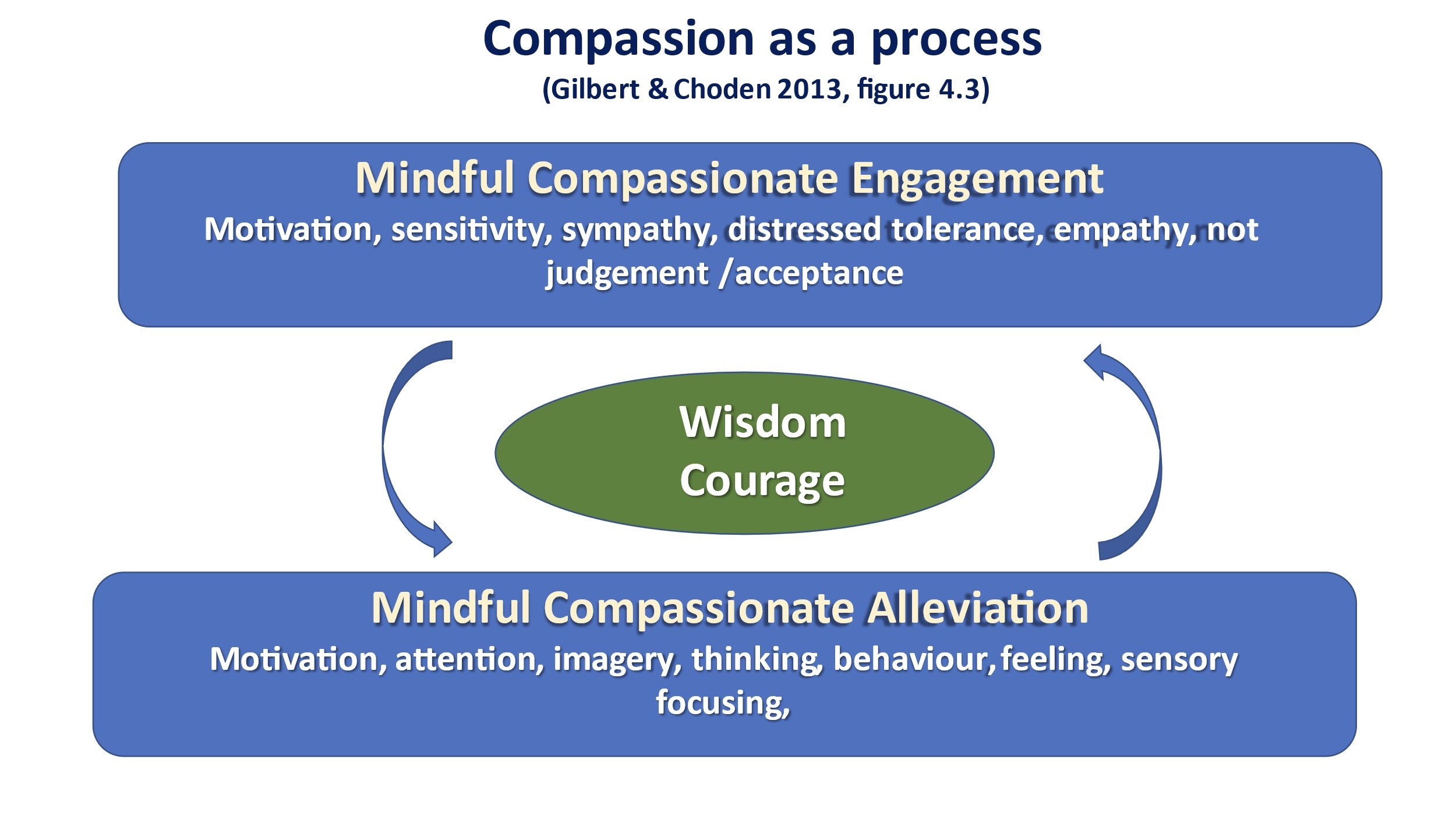Compassion as a Process (Part 2)
/Image by Dr Gráinne Schäfer
by Professor Paul Gilbert
In Part 1 I discussed the central importance of courage and wisdom in compassionate action. Now I would like to address the six competencies that help us to engage, turn towards and process suffering and six that underpin how to take wisdom. The therapist develops these for themselves but also helps the client develop their own competencies. To help us engage with suffering we need to be motivated do it, able to be sensitive when suffering arises, be emotionally moved by suffering, able to tolerate those experiences, make sense of them using empathy and be accepting rather than condemning. When it comes to action we need to switch our attention to what is likely to be helpful, run scenarios in our mind about what's likely to be helpful, use our reasoning skills, then take appropriate actions, work with our bodies so that we can then tolerate whatever feelings arise from appropriate actions according to what is needed. This is captured in the diagram.
The key to the whole therapeutic process, is that it's orientated through a compassionate perspective, a genuine desire to be in touch with suffering and to have an empathic insight into its basis. This leads to finding the wisdom for healing, for prevention, and for coming to terms with that which cannot be changed.
Slightly adapted from Gilbert & Choden (2013, figure 4.3)
These basic processes can be used in many different contexts. For example, think of how we deal with conflicts with people we love or even those we don't. In CFT there are three domains for relational processes that are helpful in achieving personal autonomy and confidence. These focus on assertiveness, apology and forgiveness. Consider each of these in the context of the above diagram.
In a relationship it's important to be clear and, as much as possible, be honest about what is going on with one’s own needs and feelings but to also have the courage and wisdom to realise that relationships are two-some’s not one-some’s. In other words, we need a focus on the other and not only on ourselves.
Assertiveness training has helped many depressed people who may be avoidant of conflict, submissive and frightened of presenting their own values and needs. However, assertiveness trainers have always been sensitive to the fact that we're not training people simply to be selfish egotists and making demands regardless of the other. So, our assertiveness needs to be compassionate and sensitive to the mind of the other but not submissive.
Clearly, a lot of close relational conflict is based on disappointment and as flawed human beings’, things can be said or done that are hurtful. So, forgiveness becomes extremely important for both small and large things. Such forgiveness requires the courage and wisdom to work with the forces within oneself that might not want to forgive and repair or might even want to be vengeful or ruminative. There is now flourishing research on forgiveness therapy.
We also need the courage and wisdom to realise that we too can be harmful particularly when we feel upset or hurt. Or, when we are overstressed, we can strike out and become aggressive and then justify our hurtful actions. We need courage and wisdom to enable us to simply notice that we are fallible human beings, not to turn it into an opportunity for a major self-beating up but to learn how to apologise and acknowledge without feeling diminished.
In conclusion, we take a motivational orientation to compassion rather than trying to list a limited set of qualities because there are a range of processes that are involved in compassion that vary according to context. As we come to understand these processes and how they vary from situation to situation and from client to client we can be clearer on how to root therapy in compassion motivation. At its core, is the motivation to address suffering and prevent it and to do it courageously and wisely. This is the same orientation for both the therapist and the client.
-----------------------------------------------------------------------------------------------------------------------
Here is a link to Paul Gilbert speaking on courage and compassion on The Mindful Living Show.
This article originally appeared in the CMA newsletter. You can subscribe to the newsletter here.



